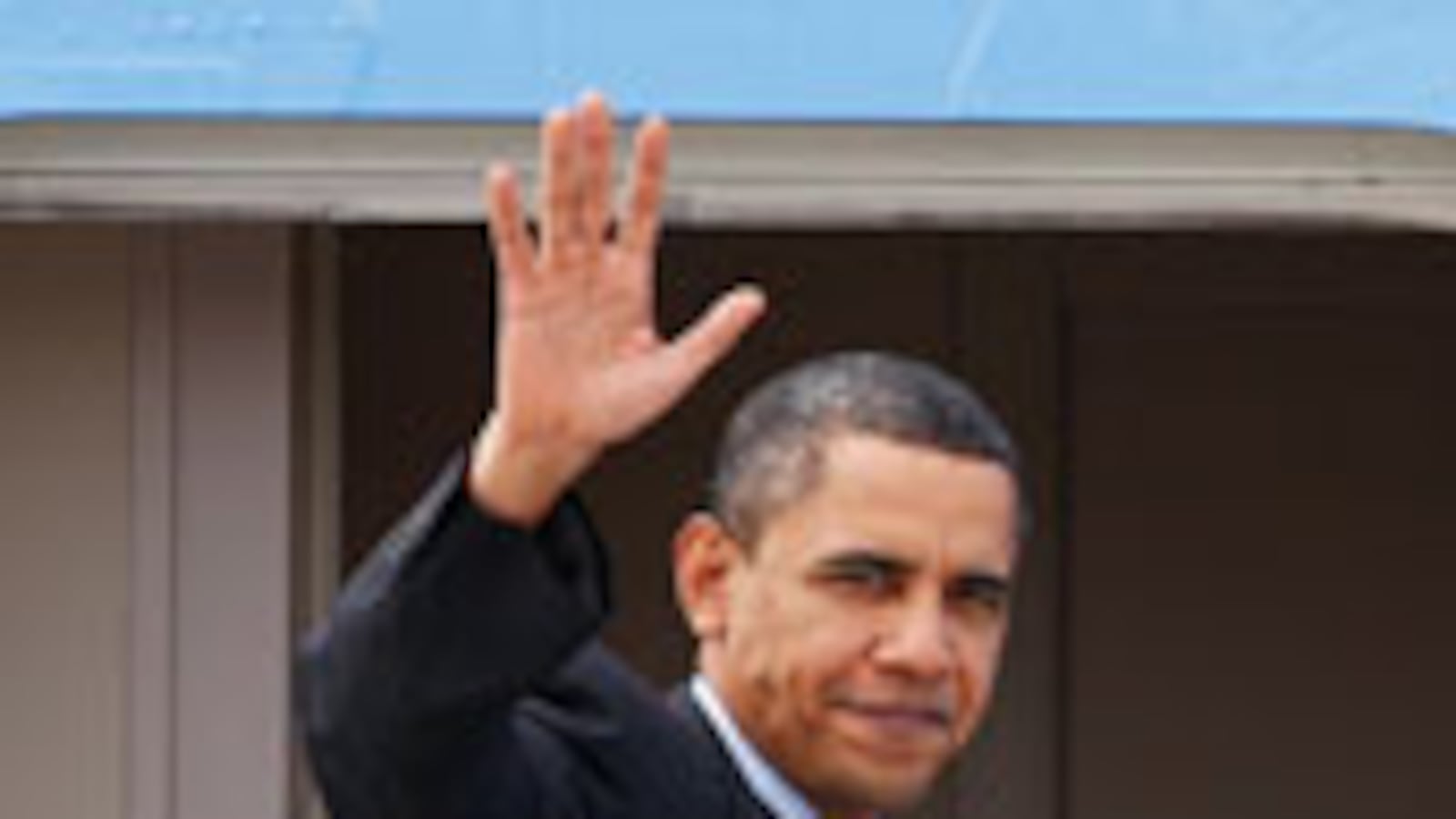
Tucked away under a list of medications in the report on President Obama’s recent physical exam is this intriguing notation: “Jet lag/time zone management, direct physician prescribed program, occasional medication use.” Obama’s doctor, Navy Capt. Jeffrey Kuhlman, didn’t say what drug the president might be taking to fight the mind-numbing effects of crossing too many time zones. But sleep doctors we consulted say one possibility is Provigil, a stimulant that is regularly prescribed to help people fend off excessive sleepiness.
Fans claim you get all the benefits of a triple shot of espresso without the jitters or anxiety that can accompany a massive hit of caffeine.
“If they’re going to give him something to wake him up, Provigil is the way to go,” says Dr. Lisa Shives, medical director of Northshore Sleep Medicine in Evanston, Illinois.
While the White House won't say what the president is actually taking, Provigil (also known by its generic name modafinil) is an intriguing possibility. The drug has acquired an almost mythic status in recent years as a pill that makes it possible for the user to bypass the all-too-human need for sleep and work 24 or even 36 hours at a stretch. Manufactured by Cephalon, it’s in a class of medications called “wakefulness promoting agents.” Fans claim you get all the benefits of a triple shot of espresso without the jitters or anxiety that can accompany a massive hit of caffeine. It’s reported to be increasingly popular among sleep-deprived cohorts like long-distance truckers, fighter pilots, and students pulling all-nighters—and brought in $1 billion for Cephalon in 2008.
One little hitch: It’s not approved by the Food and Drug Administration for this purpose. The FDA says modafinil can only be marketed as a treatment for three things: narcolepsy, shift-work sleep disorder and excessive daytime sleepiness in patients who have been treated for obstructive sleep apnea. Using the drug to keep patients awake after a long trip would be considered “off-label,” although it’s perfectly legal and very common, says Shives. And that off-label status could soon change. The FDA is reviewing Cephalon’s application to market a drug called Nuvigil, which is similar to Provigil, as a jet-lag remedy.
Modafinil does sometimes have side effects, including rashes, headaches, dizziness, and nausea. Still, occasional use of the drug (if that’s indeed what Obama has taken) isn’t likely to have long-term consequences, doctors say. “I wouldn’t be worried,” Shives says. Shives said she thinks Obama could also be taking a sleep aid like Ambien or Lunesta “so that he can go to sleep at a time when it might be unnatural for his circadian rhythm.” The effect of both drugs can last up to eight hours, which is why you shouldn’t take them if you need to be alert in less time. Another drug, Sonata, works much the same way but is shorter-acting, Shives says.
Ambien has had bad press in recent years—and it might be a riskier choice for the president. There have been reports of patients on Ambien sleepwalking and sleep-eating, and even occasional stories about people who drove while on Ambien and didn’t realize they were behind the wheel. When her patients complain of side effects, Shives simply tells them to stop taking the drug. “You do hear reports of some strange and bad behavior but you have to put that in the context of how many millions of people take this drug” without these problems, she says.
Again, we don’t know exactly what the president has taken to fight jet lag. But if these drugs are indeed part of his treatment, it’s easy to see why his doctors might have resorted to medication. Scientists have been studying jet lag for years and they’re just beginning to understand how body rhythms work to help us fall asleep and stay awake at regular times. It’s a very delicate system and you mess with it at your peril. The sleep-wake cycle shifts slowly; you can’t push it around more than an hour or two a day, says Charmane Eastman, director of the Biological Rhythms Research Lab at Rush University Medical Center in Chicago. “It’s very hard to get it to go faster,” she says.
Eastman has been studying jet lag for many years. She’s even devised schedules to help astronauts trick Mother Nature and avoid sleep problems in deep space. Her plan works for ordinary road warriors as well, and it could be what Obama’s doctor meant by “time zone management.” For a few days before you take off, you gradually shift your sleep and wake times either ahead or back, depending on which direction you’re headed. Eastman also advises using bright light (from a light box or outdoor light) and the hormone melatonin, which can help reset the body clock. A dose of melatonin in the morning resets your body clock later while a dose in the afternoon resets it earlier. Bright light in the morning resets your clock earlier while bright light at night resets it later.
If Obama followed Eastman’s recommendations, he could arrive at his destination already in sync with his new time zone and might not even need anything else to stay alert. “I would love to make a schedule for him,” Eastman said. “It would be fun.” And also timely: Obama is next scheduled to leave the country on March 18. His destination: Australia and Indonesia, another 12 time zones away.
Barbara Kantrowitz is a contributing editor at Newsweek and co-author of The Menopause Book (Workman Publishing, 2009).






